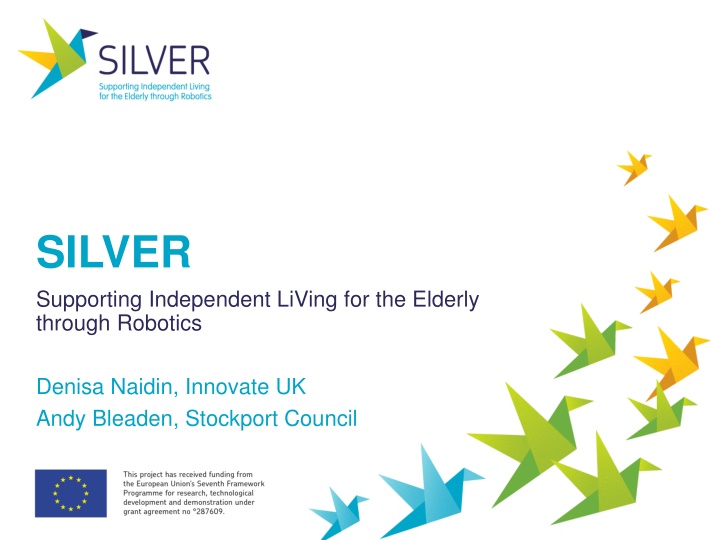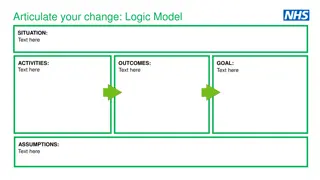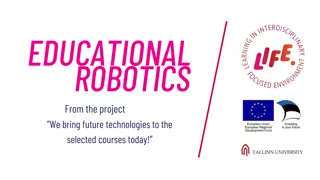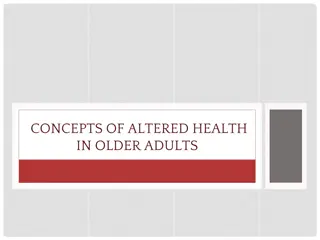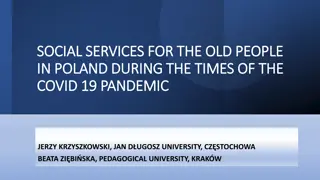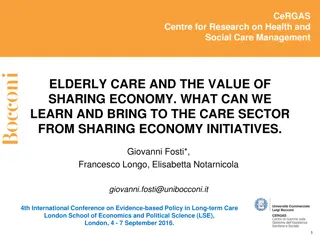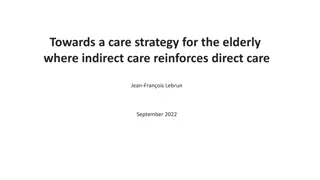SILVER Project: Robotics for Elderly Care Innovation
SILVER (Supporting Independent Living for the Elderly through Robotics) project focuses on developing robotics-based technologies to assist elderly individuals in their daily lives. Utilizing a Pre-Commercial Procurement (PCP) approach, the project aims to enable municipalities to care for more elderly recipients efficiently. Funded by the European Commission, this initiative involves local authorities from various countries and aims to enhance elderly care services. Through market consultations and learnings, the project underscores the importance of understanding local needs, fostering inter-departmental cooperation, and establishing sustainable relationships with contractors for successful implementation.
Download Presentation

Please find below an Image/Link to download the presentation.
The content on the website is provided AS IS for your information and personal use only. It may not be sold, licensed, or shared on other websites without obtaining consent from the author.If you encounter any issues during the download, it is possible that the publisher has removed the file from their server.
You are allowed to download the files provided on this website for personal or commercial use, subject to the condition that they are used lawfully. All files are the property of their respective owners.
The content on the website is provided AS IS for your information and personal use only. It may not be sold, licensed, or shared on other websites without obtaining consent from the author.
E N D
Presentation Transcript
SILVER Supporting Independent LiVing for the Elderly through Robotics Denisa Naidin, Innovate UK Andy Bleaden, Stockport Council
What is SILVER? The SILVER project aims to develop new robotics based technologies to assist elderly people in their everyday lives. It uses a Pre-Commercial Procurement (PCP) process to encourage companies to bring to the market innovative solutions that will enable municipalities to care for 10% more elderly care recipients with the same number of care staff. Funded by the European Commission under the Seventh Framework Programme for research and technological development (FP7) Consortium led by Innovate UK, bringing together 6 local authorities in 5 countries and other regional and knowledge partners Purchasing budget: 2,150,000 EUR 2
Market consultation Kompai LEA LEA LEA HelpingHand HelpingHand Iron Arm Iron Arm Iron Arm DEXTER Mealtime 360 Wearable Bionic Exoskeleton Open call 32 applications Mar 13 Jan 12 Jun 14 Aug 15 Aug 16 5
Steep learning curve It takes time to set up a transnational PCP Little understood process beyond frontrunner countries Products developed need to fit the needs of all procuring authorities PCP often requires inter-departmental cooperation Relationship with contractors needs to be nurtured 7
but worth it! Exploration of local needs and requirements Understand the market and establish close relationship with businesses Protect against lock-in and reduce costs in the long term 8
Example: LEA LEA (Lean Elderly Assistant) is designed to assist the elderly in daily living tasks in a home environment Offers functional transfer of goods, for example picking up objects, transferring them and placing them Cognitive software capabilities can support memory Has won the Herman Wijffels Innovation Award and has been shortlisted for a Livewire award. 9
Example: Kompai - MARIO Kompai was a robotic solution that was awarded a contract in Phase 1 Contract allowed for further refinement of idea and partnership development Now transformed into the MARIO robot aimed at supporting people with dementia SME collaborates with Stockport City Council and has received further funding from Horizon 2020 10
Why did we get involved in the SILVER PCP? Market failure - to build and strengthen market Gain experience of using PCP process Work with Innovate UK Work in collaboration 12
How did we contribute to SILVER? Ethics leadership Involvement in developing the PCP process and phase documentation Liaising with the contractors and partners Developing testing plan - cross border Running tests and dissemination about PCP 13
What have we learnt from the PCP process? Know your market thoroughly ie what is needed Get expertise - Innovate UK (SBRI) and Netherlands Get ethics right early Communicate with the contractors continually 14
Being clear about your local market What do you actually want to procure? Where is your evidence? What do you know about ethics? Who is going to manage this locally? Where is the buy in? 15
Developing your testing Standards Barriers Local information and sharing it properly Involving stakeholders and end users Ethics 16
Ethics issues to look out for Medical devices European legislation National bodies Ethics plan Informed consent 17
What have we learnt from SILVER? PCP process is useful and we will reuse Effective methods of communicating with potential contractors Developed lots of tools to share on website: Cross border collaboration works - This would have failed in one country Good support from European Commission and experts 18
What do we want to do next? Engage with the contractors Share our experiences and lessons Learn some home truths about procurement Follow up connections with other SILVER partners Remain in dialogue with Commission and EIP-AHA 19
